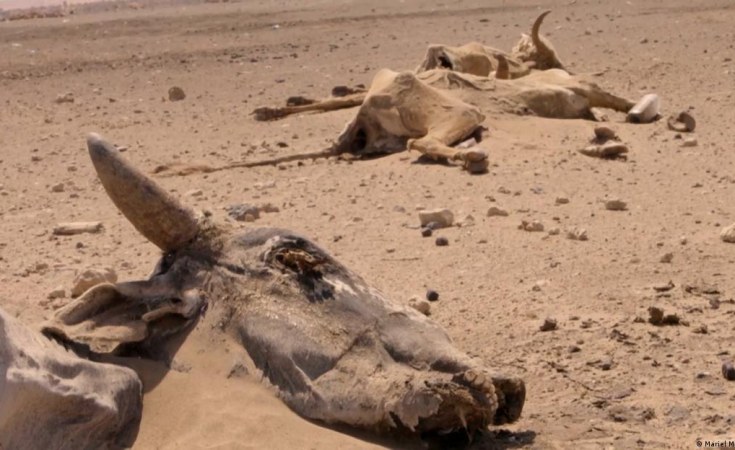Burco, Somaliland — The record-breaking drought in the Horn of Africa has affected half the population of Somalia, including in the breakaway region of Somaliland. The United Nations says if more aid does not arrive soon, Somalia will suffer its worst famine in half a century.
Hibak Hussein, the 26-year-old mother of four, moved to the Ainabo camp for the internally displaced in Somaliland's Burco district to seek aid after drought killed her livestock.
Hussein said the livestock were her only source of income, so she and her children walked more than 100 kilometers to the camp in search of relief. But even in the camp, she said sometimes she doesn't have any food, and her family is forced to go to bed hungry.
Many Somalis are nomadic pastoralists. With livestock diminished by the drought that has affected 7.8 million people across Somalia, large populations have moved to IDP camps to seek aid.
Hussein is among the 1.6 million that the U.N. High Commissioner for Refugees said have been displaced by drought in the country in 2022. More than 300,000 more are facing famine, according to the U.N. Office for the Coordination of Humanitarian Affairs.
"We are actually receiving a limitless number of people dropping out from their nomadic pastoral lifestyle, because the drought is so severe that there is no pasture for livestock," said Amran Shire, humanitarian program manager for Care International in Somaliland. "There is no water for both livestock and human consumption."
More than 40 million people are struggling with hunger fueled by a record drought in the Horn of Africa that has killed more than 10 million animals. The worst situation is said to be in Somalia, including the breakaway Somaliland region.
"So, the situation is grave," said Deepmala Mahla, Care International's vice president for humanitarian affairs. "But the worst part is that our humanitarian response collectively is not matching the needs. People are dying right now, and we would be seeing a higher number of deaths next year if we don't step up immediately."
Compounding the problem for Hussein, her two youngest children are malnourished -- the youngest severely.
About 1.8 million children under the age of 5 face acute malnutrition across Somalia, according to a report by UNICEF.
Khadra Jama, a nutrition nurse at Ainabo Health Center, told VOA the facility records a daily average of 10 to 15 cases of malnourished children. While the staff works to stabilize them and send them to hospitals, some of those patients die, she said.
In a trip organized for journalists by Care International, VOA visited five IDP camps in Burco district and recorded tales of families that walked hundreds of kilometers through conflict-ravaged areas in search of humanitarian aid.
The last severe famine in Somalia in 2011 left more than a quarter-million people dead, half of them children. Humanitarian groups warn of a repeat of the situation.
"The starving people of Somalia, they are all looking at us," Mahla said. "And let me remind the international community and world leaders -- you promised in 2011, you promised to Somalia that never again. You promised again in 2017 that never again. Why is it happening again? We can still prevent it. We can still save lives and livelihoods. Please step up and act now."
As famine spreads in Somalia, for those like Hussein who are affected by drought, the situation could not be any worse.


